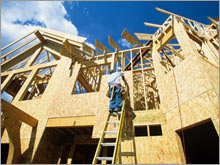Housing starts at decade lowStarts and permits both fall more than forecasts as builders pull back from troubled market.NEW YORK (CNNMoney.com) -- Housing starts and permits both fell to their lowest levels in more than a decade, as the latest readings on the battered housing and homebuilding markets came in below expectations Thursday. Housing starts fell 6.1 percent to an annual rate of 1.38 million in July from a revised 1.47 million rate in June. Economists surveyed by Briefing.com had forecast starts would fall to a 1.41 million pace in June.
Mortgage Rates
The latest reading is the lowest level of starts since January 1997 and is down nearly 21 percent from the year-earlier level. Starts of single-family homes fell even more sharply, dropping 7.3 percent to just over a 1 million annual rate, the lowest since December 1996 and the second lowest level in more than 12 years. Building permits, which are often seen as a snapshot on builders' view on the state of the market, fell to an annual rate of 1.37 million from the June figure of 1.41 million, marking the lowest level since October 1996. Economists had forecast a rate of 1.4 million. Permits for single-family homes fell to just over a 1 million pace, the lowest level in more than 12 years. The report comes the day after a survey of members by the National Association of Home Builders showed builders' confidence in the market at a 16-year low. In one respect, the weak level of home construction could be a long-term benefit to the battered housing market. One thing pushing down on home values and even sales activity is a glut of both new and existing homes for sale on the market, which is scaring off prospective buyers. A separate Census Bureau report showed there were 538,000 new homes available for sale on the market in June, including those that were permitted and not yet started. There were also 177,000 completed new homes available for sale, up 31 percent from a year ago, as the typical time it takes a builder to sell a completed home has risen to six months from less than 4 months a year earlier. It marked the longest time it took to sell completed homes since August 1993. "I think the builders should be applauded for their behavior at this point," said David Seiders, chief economist for the National Association of Home Builders. "The last thing we need is an increase in production." But even with builders slamming the brakes on the supply of new homes, the sharp drop in building is a drag on the nation's economic activity. It also could be seen as a sign of the worsening credit crunch that is hitting global financial markets. "There is no conceivable way the economy will escape the housing slowdown completely, at this point," said Adam York an economist with Wachovia. Earlier Thursday, embattled Countrywide Financial (Charts, Fortune 500), the nation's No. 1 writer of mortgage loans, was forced to tap an $11.5 billion line of credit Thursday to address its looming liquidity crunch, and it said it is toughening the underwriting standards on the home loans it will make going forward. Seiders at this point is forecasting that starts will slide a bit more to an annual rate of 1.3 million before the end of the year, and see any significant pickup until 2008 at the earliest. "The vast majority of this downward slide is behind us, but we have further distance to go to stabilize," he said. But he also cautioned that the developing crisis in credit markets could force him and other economists to cut forecasts on starts and sales even further in the coming months. "The uncertainties are immense. We don't know when markets are going to come back into some sensible balance," he said. "It could be worse, there's no question." The current downturn in housing, new home sales and home prices has hit the results of most homebuilders. The nation's six largest builders in terms of revenue - Lennar (Charts, Fortune 500), D.R. Horton (Charts, Fortune 500), Centex (Charts, Fortune 500), Pulte Homes (Charts, Fortune 500), KB Home (Charts, Fortune 500) and Hovnanian Enterprises (Charts, Fortune 500) -- all have reported losses in at least their most recent quarter, and most are forecast to have losses continue into 2008. |
|


